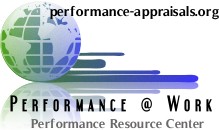Epic Performance Appraisal Failure - Doing TO Vs. Doing WITH
In looking at differences between managers who succeed with performance reviews and those who apparently do not, something else emerges. M
Managers who do not profit from performance reviews often believe, consciously or not, that they must do or give something to the employee. In other words they see their roles as evaluating, as deciding how well the employee has done.
Managers who profit from performance reviews consider the review as an opportunity to discuss performance with employees.
If, for example, you could observe Mike and Jessica during their reviews with employees, you would see that Jessica does
most of the talking during her sessions, while Mike does much
less talking and far more questioning and encouraging the employee to self-evaluate. This is important, since it puts Mike and each employee on the same side and, even more important,
it puts some evaluative and problem-solving responsibility just where it should sit—on the shoulders of the employee.
Why? The employee is the only person who is there for every job task he or she performs, the constant observer of performance.
The manager is not. Despite what most managers think, an employee doing a job for eight hours every day knows a lot more about the job than the manager and is in a far better position
to solve job-related problems than anyone else. If the employee isn’t allowed the opportunity to do so, a very valuable benefit of the performance review is lost.
